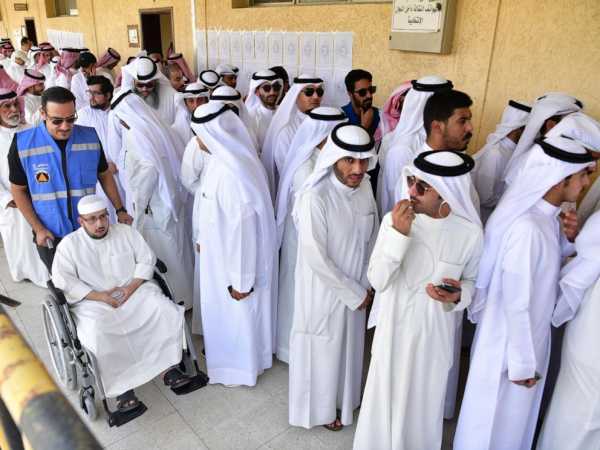
DUBAI, United Arab Emirates — Voters in Kuwait returned most of their lawmakers to parliament in the third election in as many years amid widespread frustration with the ongoing political gridlock, according to results released Wednesday.
Thirty-seven lawmakers kept their seats in the 50-member assembly following Tuesday's election, the state-run KUNA news agency said. Authorities did not release an official turnout figure, which analysts had expected to be low. Politicians belonging to the loosely defined opposition won 29 seats.
Kuwait is alone among Gulf Arab countries in having a democratically elected parliament that exerts some checks on the ruling family — which nevertheless appoints the government and can dissolve the assembly at will.
“People voted the same because they feel that the parliament wasn’t given enough time to try to effect change,” said Courtney Freer, a visiting professor of Middle Eastern studies at Emory University. “They feel like there’s nothing wrong with the legislature and that what was wrong was its relationship with the unelected cabinet and blame it for more of the gridlock.”
In recent years, political stalemate between the appointed government and the assembly has prevented the enactment of even basic reforms in the small, oil-rich country.
The last election, held in September, delivered a mandate for change, with a majority of incumbents exiting the chamber. But in March, the Constitutional Court annulled the decree dissolving the previous assembly, restoring the body that had been elected in 2020. The ruling family then dissolved that chamber a second time, setting up this week's vote.
Only one woman was elected to the 50-member assembly this time around, while the last parliament had two and the one before it was entirely male. Women's rights activists say the country is regressing in part because of the growing power of conservative Islamists and tribal members in parliament.
Marzouq al-Ghanim, an influential politician who served as speaker in the 2020 parliament, could soon return to his office after being re-elected. The scion of a powerful family, seen as representing the country's business community, he has been fiercely critical of Kuwait's incumbent prime minister, who is the son of its octogenarian ruling emir.
Al-Ghanim is likely to face off against Ahmed al-Saadoun, a veteran opposition politician who served as speaker of the 2022 parliament. Al-Saadoun held onto his seat but received less than half the 12,000 votes he secured last September. “The support of (al-Saadoun) is very well, this is the return of the 2022 parliament, not the 2020 parliament, and many of the key supporters of Marzouq al-Ghanim lost,” said Kristin Diwan, senior resident scholar at the Arab Gulf States Institute in Washington. “But I would never count Marzouq al-Ghanim out of anything, he’s very savvy and definitely came out in a top position in this election.”
Kuwait's political stalemate worsened after the 2020 death of its ruling emir, Sheikh Sabah Al Ahmad Al Sabah, a seasoned diplomat who led the country for close to 15 years.
The 91-year-old was succeeded by his ailing half-brother, Sheikh Nawaf Al Ahmad Al Sabah, with Crown Prince Sheikh Meshal Al Ahmed Al Jaber Al Sabah assuming day to day rule. Both are in their 80s, and the line of succession after Sheikh Meshal is unclear.
Sheikh Nawaf's son, Sheikh Ahmad Nawaf Al Ahmad Al Sabah, was appointed prime minister last year but has lately come under fierce criticism from al-Ghanim and others.
As is the custom after an election, Sheikh Nawaf ordered the Cabinet dissolved ahead of the new parliament taking its seats. The new parliament is set to have its first session on June 20.
Kuwait is one of the world’s wealthiest countries, with the sixth largest oil reserves and cradle-to-grave welfare for its 1.5 million citizens. But many say the government has not properly invested in education, health care, and other services.
Sourse: abcnews.go.com






